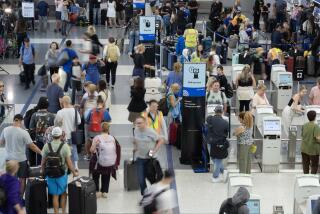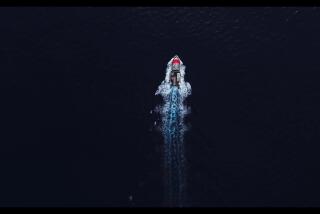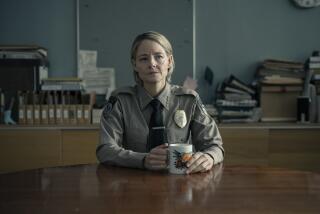Travel Horrors: Weather : The Case of the Disappearing Flight Path : The airliner cabin may be climate-controlled, but outside, in the real world, winter reigns
- Share via
The snow that they had been warning us about for days started early in the morning. I sat in my mother’s kitchen in Phillipsburg, N.J., and thought of how far I was from my home in Fort Lauderdale, Fla. The flakes were the thin, wispy sort that signal accumulation. I called the airport and asked USAir if I could change my afternoon flight to one before noon. Perhaps it is the inevitable result of having grown up in a small town, but whenever I return I fantasize, fearfully, about never being able to leave.
Once at the airport outside Allentown, I learned that my new flight had been canceled: De-icing equipment had broken down in Reading, the plane’s starting point. An exceedingly helpful and apologetic USAir employee got me a first-class seat on a 12:30 p.m. Delta flight to Atlanta.
“Wonderful,” I thought. “The sooner I get out of this storm the better.” But at the Delta counter I learned that the 12:30 flight made a stop in Harrisburg. Harrisburg, being directly west, would already be well into drifts.
I bought the Sunday New York Times and sat in the waiting area looking out at the snow. My mother has always hated the stuff, fearing accidents and the weight of cabin fever. Every snowstorm for me was five inches too little. I grew up in the snow, drove in it, played basketball in it. But I had never flown in it. Now I watched it fall with new respect.
Shortly past noon we boarded the plane. From my window seat I stared gloomily out at the frigid landscape, then turned my gaze inside, where everything was summery--men in shirt sleeves reading the paper, chipper flight attendants passing out drinks. They seemed oblivious.
And they were. Planes fly in snow all the time. I thought of Reykjavik, Anchorage, Vladivostok. There’s a concept to send chills down your spine: Aeroflot de-icing equipment.
I thought of loved ones saying, ‘If only he hadn’t switched flights.’ I thought of people who would apply for my job.
The captain, quite serene himself, explained the de-icing process now going on. “You’ll see a truck come around,” he said, playing the high school science instructor, “that looks a bit like a fire engine.” I saw nothing, but heard the scrape of liquid on ice-cold metal.
We took off in a world stilled by snow. Twenty minutes later we were circling over Harrisburg, waiting for ground visibility to improve.
There was hardly any sense of movement. We seemed to be suspended, helplessly, in a thick white gauze that was becoming as suffocating for me as a pillow. I tried to read the book review, but the books seemed trite and insignificant.
The pilot, sounding a little less cheery, said that we would circle for another 20 minutes and if visibility didn’t improve we would still have enough fuel to get back to Allentown. See, a smaller voice said, you can’t get away.
I looked out into the void and thought of my grandmother in her house outside Harrisburg, in the small town where my mother was born. I thought of people saying, “And the ironic thing is, the body was found only a mile . . . . “
I thought of my sunny Florida balcony. I thought, as I sometimes do on trips, of the last words I had written. They were, unencouragingly, “And the sadness of a vanished age.” I thought of the students in my writing class whom I had recently told cavalierly, “The worst trips make the best stories.” What had I been thinking? I thought of loved ones saying, “If only he hadn’t switched flights.” I thought of people in the newsroom who would apply for my job.
Flight attendants were told to prepare for landing. The plane descended into lower layers of nothingness, rocking slightly from side to side. There was no sign of a bottom. Then, suddenly, white streets of darkened, lifeless snowbound houses burst through the veil. They looked forlorn, like random pieces of a train set left in an attic. Adding to my collection of morbid thoughts, I noticed a billboard for Bethlehem Steel.
*
When we reached the gate, most of the passengers got up to leave. With the possible exception of Nobel laureates, I have never envied one group of people so intensely. I studied the passengers who boarded, checking their ranks for obvious losers. I seriously wished for a man of the cloth. When the plane was just about full, I dared myself to look out the window.
It was the bleakest airfield I had ever seen. Visibility, if anything, had deteriorated. The snow fell harder and formed small crystals on my window. Three blurry plows crept up the runway like grim, reluctant reapers.
*
After a considerable wait, we taxied away from the gate. The de-icing, we were told, would take place next to the runway, as refreezing was possible if we received it sooner.
This time I saw the truck, labeled with the words ETHYLENE GLYCOL. A young man in a hood stood atop the vehicle, braving the elements and pointing a hose at us with an almost gleeful expression. He looked like one of the Ghostbusters. After he fired, a pinkish liquid washed down my window and carried off the crystals.
I got a glimpse of the runway before we turned. It was packed with snow and, though it was only 3:30 in the afternoon, its lights were ablaze, burning white in a dull white universe. I counted only four rows of bulbs, stretched across the runway, after which they disappeared into a milky nimbus. As, in a few seconds, did we.
More to Read
Sign up for The Wild
We’ll help you find the best places to hike, bike and run, as well as the perfect silent spots for meditation and yoga.
You may occasionally receive promotional content from the Los Angeles Times.






